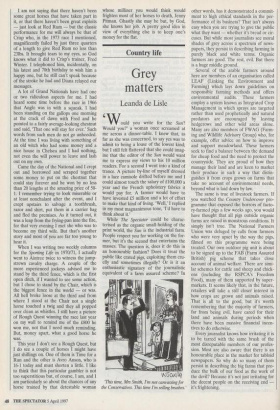Country life
Grey matters
Leanda de Lisle
Would you write for the Sun? Would you?' a woman once screamed at me across a dinner-table. I knew that, as far as she was concerned, to say yes was to admit to being a louse of the lowest kind; but I still felt flattered that she could imag- ine that the editor of the Sun would want me to express my views to his 10 million readers. For a second I went into a kind of trance. A picture by-line of myself dressed in a lace camisole drifted before me and I could almost touch the salary of £100,000 a year and the French upholstery fabrics it would pay for. A farmer would have to have invested £5 million and a lot of effort to make that kind of living. 'Well,' I replied in my most magnanimous tone, 'I'd have to think about it.'
While The Spectator could be charac- terised as the organic small-holding of the print world, the Sun is the industrial farm. People respect you for working on the for- mer, but it's the second that entertains the masses. The question is, does it do this in an honourable fashion? Does it treat the public like crated pigs, exploiting them cru- elly and sometimes illegally? Or is it an enthusiastic signatory of the journalistic equivalent of a farm assured scheme? In This time, Mrs Smith, I'm not canvassing for the Conservatives. This time I'm selling brushes.' other words, has it demonstrated a commit- ment to high ethical standards in the per- formance of its business? That isn't always easy when you are trying to give the public what they want — whether it's bread or cir- cuses. But while most journalists see moral shades of grey across a spectrum of news- papers, they persist in describing farming in purely black and white terms. Organic farmers are good. The rest, evil. But there is a huge middle ground.
Several of the arable farmers around here are members of an organisation called LEAF (Linking the Environment and Farming) which lays down guidelines on responsible farming methods and offers environmental audits. These farmers employ a system known as Integrated Crop Management in which sprays are targeted rather than used prophetically and natural predators are encouraged by leaving hedgerows and other wild areas alone. Many are also members of FWAG (Farm- ing and Wildlife Advisory Group) who, for example, offer advice on how to improve and support meadowland. These farmers seek to find a balance between the demand for cheap food and the need to protect the countryside. They are proud of how they manage their land and are keen to market their produce in such a way that distin- guishes it from crops grown on farms that take no account of environmental needs, beyond what is laid down by law.
The same is true of livestock farmers. If you watched the Country Undercover pro- gramme that exposed the horrors of facto- ry-farmed pigs a few weeks ago, you would have thought that all pigs outside organic farms are raised in monstrous conditions. It simply isn't true. The National Farmers Union was deluged by calls from farmers who were very upset by the way the pigs, filmed on this programme were being treated. Our own outdoor pig unit is about to be signed up to the FAB (Farm Assured British) pig scheme that takes close account of animal welfare. There are simi- lar schemes for cattle and sheep and chick- ens (including the RSPCA's Freedom Food), many of them supported by super- markets. It seems likely that, in the future, retailers will take a still closer interest in how crops are grown and animals raised. That is all to the good, but it's worth remembering that the majority of farmers, far from being evil, have cared for their land and animals during periods when there have been massive financial incen- tives to do otherwise.
Every journalist knows how irritating it is to be tarred with the same brush of the most disreputable members of our profes- sion. Most are also aware that there is an honourable place in the market for tabloid newspapers. So why do so many of them persist in describing the big farms that pro- duce the bulk of our food as the work of the devil? Because it's not just irritating for the decent people on the receiving end it's frightening.


























































 Previous page
Previous page